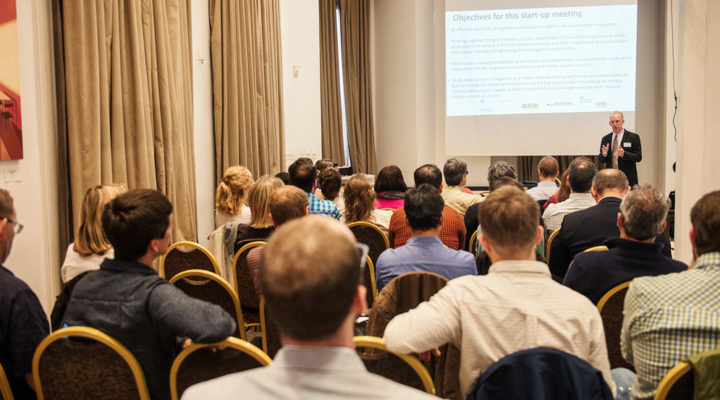INSTITUTIONAL NEWS
The UK and Argentina cooperate to advance on antimicrobial resistance
Five projects were selected to promote the research and production of scientific evidence on this subject.
Argentina and the United Kingdom decided to promote international cooperation in the field of Antimicrobial Resistance (AR), with a Memorandum of Understanding signed by the Ministries of Health and Social Care of both countries in 2018.
As part of this bi-national initiative, a joint call was launched to support joint research projects of the National Scientific and Technical Research Council (CONICET) of Argentina and the Global Innovation Fund of RA of the Department for Health and Social Care of the UK through the Biotechnology and Biological Sciences Research Council (BBSRC) and the Natural Environment Research Council (NERC).
On October 1st and 2nd, Argentine and British researchers met in the city of Buenos Aires to present five projects that were selected last year to be funded. The initiatives belong to different groups of the Servicio Nacional de Sanidad y Calidad Agroalimentaria (SENASA), Instituto Nacional de Tecnología Agropecuaria (INTA), Administración Nacional de Laboratorios e Institutos de Salud “Dr. Carlos C. Malbrán” (ANLIS) and CONICET as well as national universities such as the Universidad Nacional de La Plata, Universidad Nacional de Córdoba, Universidad de Buenos Aires and Universidad del Centro of the Province of Buenos Aires.
It is worth mentioning that the intereaction between the national institutions of Argentina are centered in the Comisión Nacional para el Control de la Resistencia a los Antimicrobianos (CONACRA), in charge of the Dirección Nacional de Epidemiología de la Secretaría de Gobierno de Salud. The CONAGRA coordinates actions between the different sectors under the focus “Una Salud” [One Health] (Human, Anima, Environment Health) since its creation in 2015.
During the Workshop, the researchers debated on how to face global problem that represents antimicrobial resistance and how to translate the results of the research work into policies and actions.
The studies are aimed determining the antimicrobials usage patterns; farmer knowledge, attitudes and practices; the structures and capacities of veterinary and para-veterinary stakeholders; water and waste management systems and sanitation; and the behaviour and transit of antimicrobial resistant organisms in food systems, and other key elements of farming systems in low and middle income countries.
The growing problem of antimicrobial resistance (AMR) threatens to reduce our ability to effectively treat bacterial infections in humans and animals. The primary contributor to the development and spread of AMR is the use of antimicrobials in human and animal medicine, and in livestock production (World Health Organization, 2000).
The contamination of animal products and the environment with antimicrobial resistant bacteria has also been identified as a risk factor for human infections with resistant organisms. In this sense, international partnerships could add significant new knowledge and value to the global effort to curb antimicrobial resistance, and address the WHO Global Action Plan on AMR – particularly objective 2, on knowledge generation, and 4, on optimizing use.
Considering the signature of this joint resolution between the Ministry of Health of Argentina and the Ministry of Agriculture, Livestock and Fisheries, in order to address the problem of antimicrobials, it is necessary to have concrete scientific evidence on the dimension of the problem. Although there have always been studies conducted by important researchers that proved the occurrence of resistance in production animals, that information corresponded to cross-sectional studies and not from official sources.
To enhance the knowledge on the role of the environment as regards the generation, dissemination and propagation of bacteria and their resistant determinants, is one of the urgent goals, according to the experts of SENASA. Therefore, the research projects presented in the framework of the bilateral collaboration program between CONICET and BBSRC/NERC will allow obtaining meaningful advances in the understanding of the AR and proposals.
